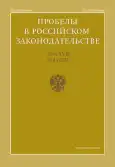Some Problems of Countering Manifestations of Extremist Sentiments Among Young People
- Autores: Bitov A.A.1
-
Afiliações:
- North Caucasus Institute for Advanced Studies (branch) of the Krasnodar University of the Ministry of Internal Affairs of Russia
- Edição: Volume 17, Nº 4 (2024)
- Páginas: 160-165
- Seção: General theoretical, criminal-legal and other problems of Countering extremism and terrorism. Problems of preventing extremism and terrorism
- URL: https://bakhtiniada.ru/2072-3164/article/view/265261
- EDN: https://elibrary.ru/HYTMHJ
- ID: 265261
Citar
Resumo
The purpose of this study is to study methods and mechanisms for countering manifestations of extremist sentiments among young people. Since 1991, modern Russia, under the influence of social, political, economic and other circumstances, has faced such a problem as “extremism”. In a few years, this problem has become a real threat to the national security of the country. Extremist sentiments are particularly acute among young people. The objectives of the study are to analyze extremist manifestations among young people, to identify the causes and sources of the emergence and spread of extremist ideas, including on the Internet, as well as to organize the development and implementation of a set of measures to prevent the spread of extremist sentiments among young people. Like all crimes committed in the modern world, extremism is also subject to change. Thus, the development of information technologies and the widespread use of the Internet have contributed to the development of information extremism. The target audience becomes the most vulnerable psychologically. It is important to note that it is young people who are the main users of Internet resources. In general, these factors contributed to the formation of a favorable environment for the spread of radical ideologies, extremism and terrorism. The use of Internet resources has no spatial restrictions, which creates a number of difficulties in the fight against extremism on the global network. The article considers the problems of countering extremism among young people, modern features of the spread of information extremism in the global information space, the increase in the influence of youth extremism, which is actively used by extremist organizations, in particular to have a negative impact on young people. The main ways of spreading extremist ideology among young people, including through a virtual social environment, as well as information and technical methods used by extremists to have a devastating impact on the younger generation are analyzed.
Texto integral
##article.viewOnOriginalSite##Sobre autores
Alim Bitov
North Caucasus Institute for Advanced Studies (branch) of the Krasnodar University of the Ministry of Internal Affairs of Russia
Autor responsável pela correspondência
Email: alim_bitov@mail.ru
Lecturer of the Department of Internal Affairs in Special Conditions
Rússia, NalchikBibliografia
- The Ministry of Justice of the Russian Federation. [electronic resource]. – Access mode: https://minjust.gov.ru/ru/extremist-materials/?page=54 & (accessed: 04/02/2024).
- On the Dark side of the Internet: What is the Dark Web and Deep Web?. [electronic resource]. URL: https://www.dgl.ru/articles/na-temnoy-storone-interneta-chto-takoe-dark-web-i-deep-web_11677.html (date of application: 04/01/2024).
- Instagram Facebook and Instagram have been banned by the court in Russia for extremism. [electronic resource]. – Access mode: https://ria.ru/20220321/instagram-1779307263.html (date of application: 04/03/2024).
- How terrorists use social media to recruit. [electronic resource]. URL: https://rb.ru/story/isis-uses-social-media / (date of reference: 04/03/2024).
- The Ministry of Internal Affairs of the Kabardino-Balkar Republic [Electronic resource]. – Access mode: https://07.мвд.рф (date of application: 04/22/2024).
- Bodrov N.F., Bimbinov A.A., Voronin V.N. Extremist materials distributed on the Internet: problems of forensic research and issues of crime qualification: monograph. Moscow: Norma, INFRA-M, 2020. 160 p.
- Buraeva L.A. On topical issues of suppressing the activities of radical communities involving young people in committing terrorist crimes / T.M. Shogenov, L.A. Buraeva, A.N. Kuchmezov // Eurasian Law Journal. 2022. –№ 2 (165). – Pp. 448-450.
- Lyuev T.H. Problems of countering extremism and terrorism in modern Russia. Gaps in Russian legislation. 2023. Vol. 16. No. 5. - pp. 138-143.
- Russia has declared a cyber war because of the special operation in Ukraine. [electronic resource]. – Access mode: https://lenta.ru/brief/2022/03/03/kibervoyna / (accessed 04.04.2024).
- Russian Foreign Ministry: cyber attacks on Russia are conducted by 22 hacker groups, including from the United States and Ukraine. Electronic resource]. – Access mode: https://iz.ru/1347462/2022-06-09/mid-soobshchil-o-22-vedushchikh-kiberataki-na-rf-gruppirovkakh (date of application: 04/02/2024).
Arquivos suplementares








